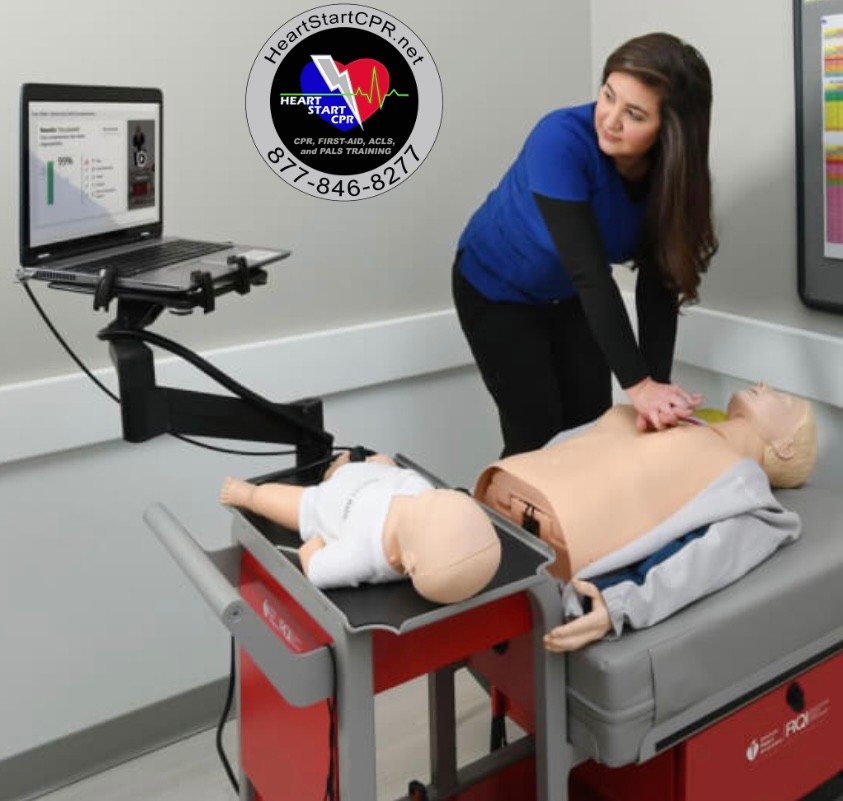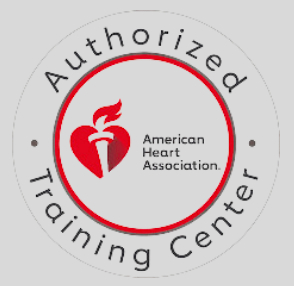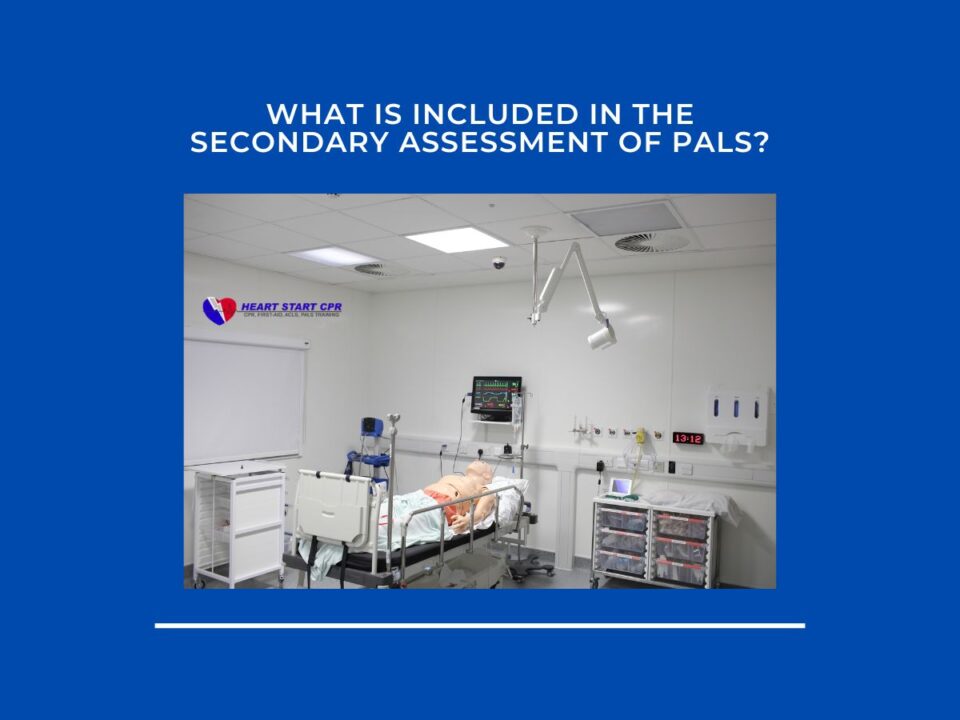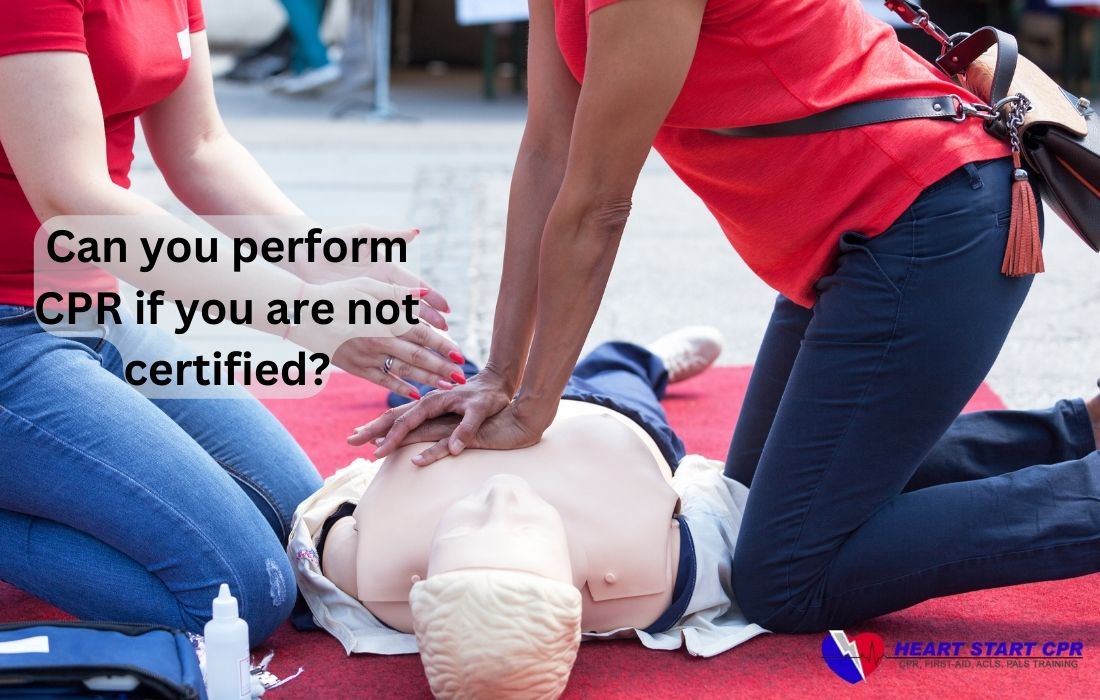
Can You Perform CPR If You Are Not Certified?
January 23, 2023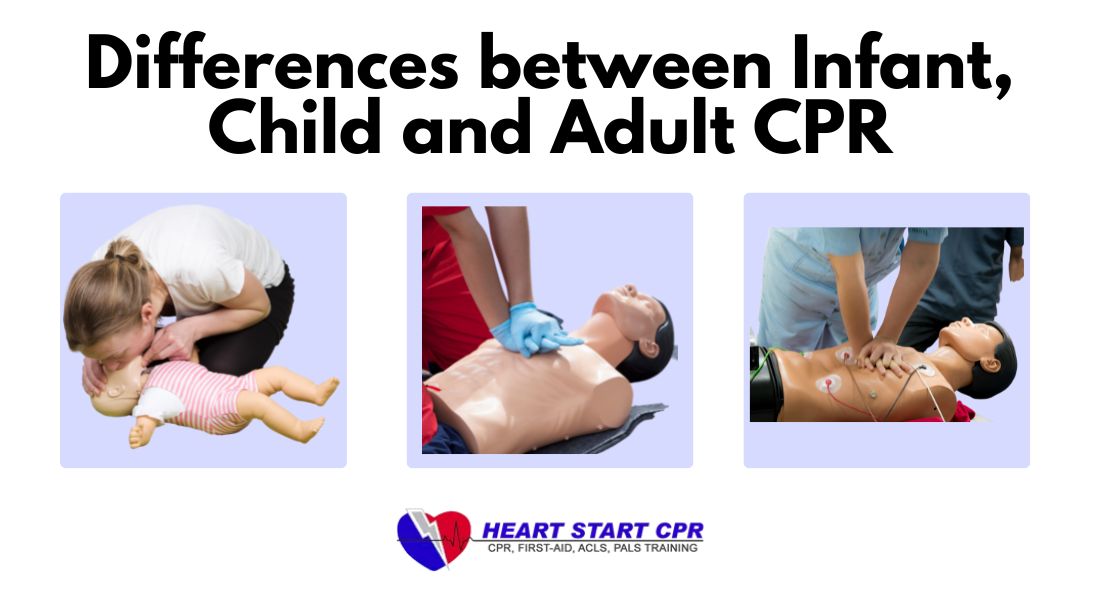
Difference Between an Adult, Infant and a child CPR
January 25, 2023What is PALS training? Like basic Life Support (BLS) and Advanced Cardiac Life Support (ACLS), the PALS course trains individuals to recognize life-threatening situations and how to respond effectively. PALS certification training can be an important step in your journey as a healthcare professional. PALS, or Pediatric Advanced Life Support, is a protocol and guidelines for providing advanced medical care to critically ill or injured children. By obtaining PALS certification, you will gain the knowledge and skills of the PALS algorithm and the necessary process to improve the quality of care for critically ill children and increase their chances of survival. Heart Start CPR offers up-to-date training materials, such as PALS algorithms and mega codes, to help you succeed in your certification. Take the first step and learn more about PALS and the benefits it can provide in your job or training in life resuscitation practices
What is PALS and its purpose?
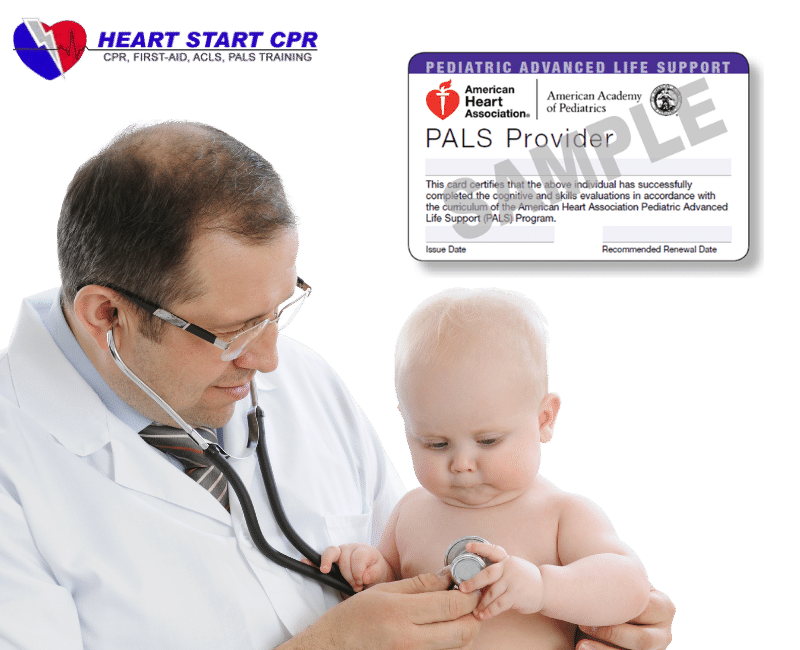
A Pediatric Advanced Life Support/PALS program, or PALS treatment algorithm is a protocol and guidelines for healthcare providers who may encounter critically ill infants and children. It covers various topics, including assessment, management, and treatment of respiratory and cardiac emergencies, shock, and other life-threatening conditions. PALS aims to improve the quality of care for critically ill children and increase their chances of survival. PALS is an American Heart Association (AHA) certification program that requires training and recertification every two years.. It is typically recommended for healthcare professionals such as paramedics, nurses, and physicians who may encounter critically ill children.
PALS (Pediatric Advanced Life Support) aims to provide healthcare professionals with the knowledge and skills necessary to effectively assess, manage, and treat critically ill or injured children. The protocol includes Pediatric Advanced Life Support guidelines for recognizing and responding to respiratory and cardiac emergencies, shock, and other life-threatening conditions. By following these guidelines, healthcare professionals can improve the quality of care for critically ill children and increase their chances of survival. PALS also provides a certification program for healthcare professionals who wish to demonstrate their proficiency in these life-saving techniques.
PALS Algorithm, Protocols and Guidelines
PALS (Pediatric Advanced Life Support) protocols and guidelines are designed to provide healthcare professionals with the information they need to effectively assess, manage, and treat critically ill or injured children. The PALS treatment algorithms cover a wide range of topics, including:
- Cardiac arrest: guidelines for recognizing and responding to cardiac arrest in children, including advanced life support measures such as chest compressions, defibrillation, and advanced airway management.
- Respiratory distress: guidelines for recognizing and managing respiratory distress in children, including oxygen therapy, positive pressure ventilation, and advanced airway management.
- Shock: guidelines for recognizing and managing shock in children, including fluid therapy and other interventions to improve perfusion.
- Algorithms: PALS provides a set of algorithms that healthcare professionals can use to guide their decision-making and management of critically ill children.
- Mega codes: PALS also provides scenarios-based training called mega codes, which simulate real-world emergency situations and help healthcare professionals practice the PALS protocols.
- Teamwork and communication: PALS guidelines also emphasize the importance of effective communication and collaboration in providing advanced life support to children.
- PALS also includes guidelines for specific conditions such as sepsis, trauma, etc.
- PALS also provides guidelines for post-resuscitation care, such as monitoring and transporting critically ill children.
These Pediatric Advanced Life Support guidelines and protocols are updated regularly to keep up with the latest advances in pediatric care and to ensure that healthcare professionals are equipped with the most current knowledge and best practices for treating critically ill children.
Related post: Pediatric Basic Life Support Algorithm
Importance Of PALS
PALS (Pediatric Advanced Life Support) is important because it provides healthcare professionals with the knowledge and skills related to effective pediatric assessment, manage, and treat critically ill or injured children. With the guidance of the PALS algorithm, protocols, and guidelines, healthcare professionals can provide the appropriate level of care to critically ill children, which could lead to better outcomes and increased mortality rates.
Additionally, PALS is important because it provides a standardized approach to the care of critically ill children. This means that healthcare professionals trained in PALS can offer the same level of care regardless of where they work or the specific case they are dealing with. This consistency in care can lead to better outcomes for critically ill children.
PALS also provides a certification program, an important step for healthcare professionals who wish to demonstrate their proficiency in advanced life support techniques for children. PALS certification is a way to show that a healthcare professional has the knowledge, skills, and experience to provide advanced care for critically ill children.
Finally, PALS is important because it is continually updated with the latest advances in pediatric care. This means that healthcare professionals trained in PALS are equipped with the most current knowledge and best practices for treating critically ill children.
PALS in Emergency Medicine and Pediatric Care
PALS (Pediatric Advanced Life Support) is critical in child related emergencies medicine and pediatric care. In emergency medicine, PALS provides healthcare professionals with the knowledge and skills to effectively assess, manage, and treat critically ill or injured children in emergencies. This can include providing advanced life support measures such as chest compressions, defibrillation, and advanced airway management to children in cardiac arrest. PALS also provides guidelines for recognizing and managing respiratory distress, shock, and other life-threatening conditions in children.
In pediatric care, PALS provides healthcare professionals with the knowledge and skills to provide advanced medical care to critically ill or injured children in emergency and non-emergency settings. This can include providing advanced life support measures such as chest compressions, defibrillation, advanced airway management to children in cardiac arrest, and ongoing care for critically ill children.
PALS also provides healthcare professionals with the training to work as part of a team and to communicate effectively with other healthcare providers to ensure that critically ill children receive the best possible care. It also provides guidelines for post-resuscitation care, such as monitoring and transporting critically ill children. This can help to ensure that critically ill children are transported to the appropriate facility for further treatment and to improve their chances of survival.
What is PALS Certifications?
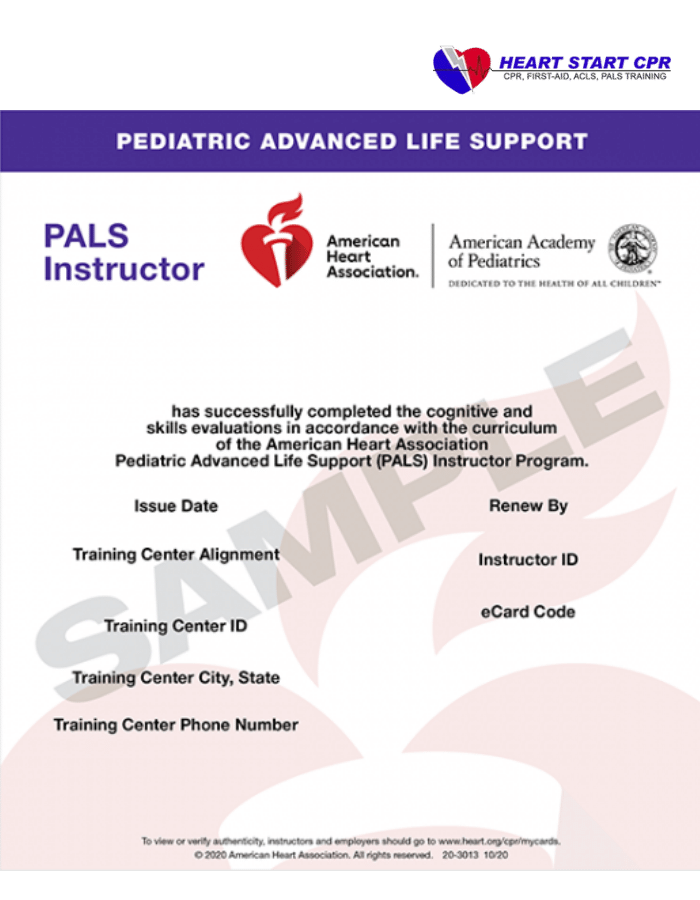
PALS (Pediatric Advanced Life Support) certification is a way for healthcare professionals to demonstrate their proficiency in providing advanced medical care to critically ill or injured children. So How to get PALS certified? To get certified in PALS, individuals must complete an approved PALS training course and pass a certification exam. The certification is typically valid for two years, after which individuals must complete a PALS recertification course and pass a recertification exam to maintain their certification.
PALS certification is typically recommended for healthcare professionals such as paramedics, nurses, and physicians who may encounter critically ill children. It can also be useful for other healthcare professionals, such as respiratory therapists, emergency medical technicians (EMTs), and physician assistants who may be involved in caring for critically ill children.
PALS certification is important for healthcare professionals who wish to demonstrate their proficiency in advanced life support techniques for children. It can help to ensure that critically ill children receive the best possible care.
PALS Certification Module:
The module explores the unique challenges in pediatric emergencies, emphasizing early intervention. It provides an overview of PALS training, highlighting teamwork and integration with other life support programs. Participants learn systematic PALS algorithms for cardiac arrest,f bradycardia, tachycardia, and shock, with practical application and certification assessment. Continuous learning and resources for maintaining certification are emphasized in the conclusion.
Module Objectives:
- Understand the importance of PALS certification in providing advanced care to pediatric patients.
- Familiarize participants with the unique aspects of pediatric emergencies and their management.
- Provide an overview of the PALS program, its history, and its significance in improving patient outcomes.
- Introduce participants to the PALS algorithm and its role as a systematic approach to pediatric resuscitation.
Module:
- Introduction to PALS Certification
- Pediatric Patients in Critical Situations
- Overview of PALS Training
- Understanding PALS Algorithms
- Applying Paediatric Advanced Life Support Guidelines
- Certification Examination
- Conclusion and Ongoing Education
Why PALS Training?
PALS training employs a systematic approach to address critical situations involving infants and children for effective resuscitation. PALS aims to improve patient outcomes through a combination of key interventions and medical protocols.
The systematic approach in PALS is evident in three primary components:
Assessment: PALS emphasizes a systematic pediatric assessment of the pediatric patient, including evaluating their airway, breathing, and circulation (ABCs), and determining the level of consciousness. This step helps healthcare providers quickly identify any life-threatening issues and prioritize interventions accordingly.
Intervention: PALS outlines a systematic approach to interventions, including techniques such as airway management, ventilation, chest compressions, and medication administration tailored to the pediatric population. Providers are trained to apply these interventions promptly and accurately based on the child's condition and specific algorithms.
Teamwork and Communication: Effective teamwork and communication are essential aspects of the PALS systematic approach. Healthcare providers are taught to work collaboratively in a coordinated manner during pediatric emergencies. This includes clear roles and responsibilities, synchronized efforts, and efficient communication to ensure the best possible outcome for the patient.
Must Read: Steps for Conducting Primary Assessment Using PALS Algorithm
Who Needs PALS Certification?
PALS (Pediatric Advanced Life Support) certification is typically required for healthcare providers who are likely to encounter pediatric patients in emergency or critical care settings. This certification is essential for individuals who may need to respond to life-threatening situations involving infants and children. Here are some of the medical professionals who commonly need PALS certification course:
- Pediatricians
- Nurses
- Emergency Medical
- Technicians (EMTs) and
- Paramedics
- Anesthesiologists and Nurse
- Anesthetists
- Physician Assistants (PAs)
- Respiratory Therapists
- Pharmacists
- Dentists
- Instructors and Educators
- Flight Nurses and Paramedics
Get PALS Certifications at Heart Start CPR
Take the first step in providing advanced medical care to critically ill children. Get your PALS certification today at Heart Start CPR! Our team of experienced healthcare professionals will provide you with the knowledge and skills necessary to pass the certification exam in our PALS class and make a difference in the lives of critically ill children. Don't wait; sign up for our PALS certification course now.

